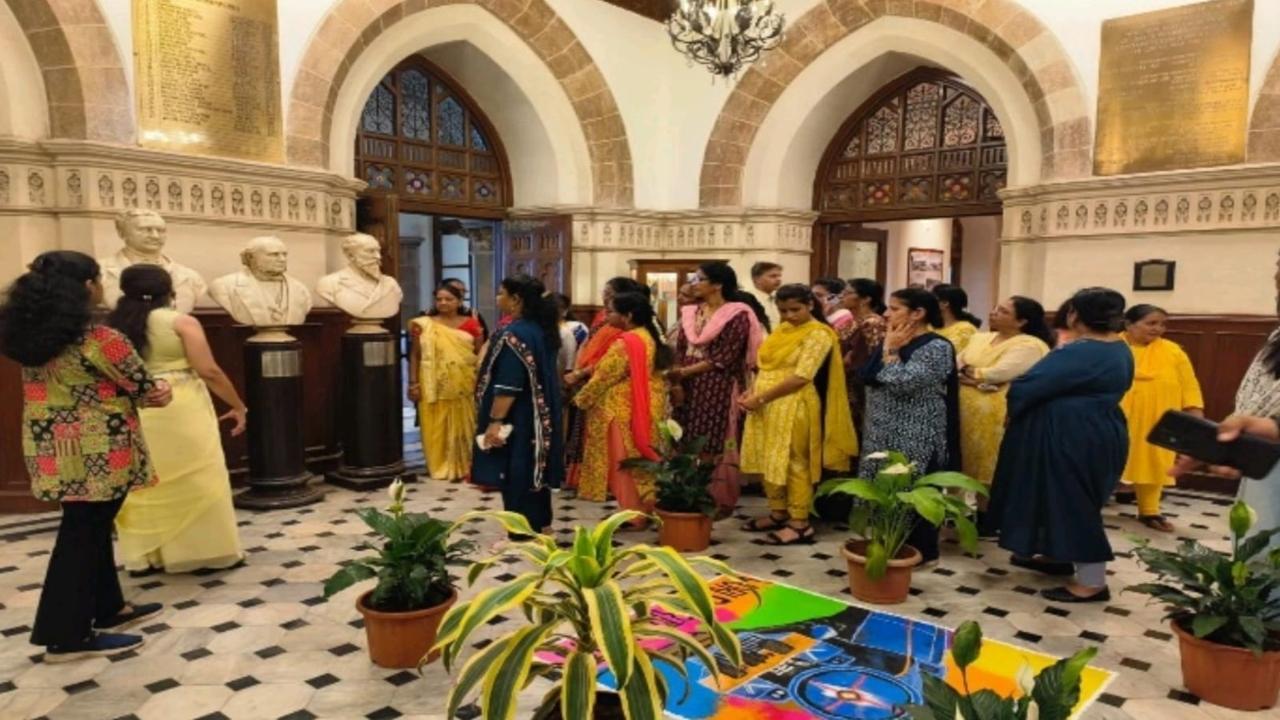The walk, organised specially for the women staff members, offered a unique opportunity to explore the over-a-century-old Western Railway headquarters. Thirty-two women staffers participated in it, guided through stories and architectural details that reflected the close ties between the railways and the city of Mumbai

Women staffers of Western Railway take part in the Heritage Walk.
The Western Railway commemorated the World Heritage Day 2025 on Thursday, April 18, by highlighting the rich architectural and historical legacy of its iconic buildings through a series of events, including a special heritage walk at its Churchgate headquarters.
The walk, organised specially for the women staff members, offered a unique opportunity to explore the over-a-century-old Western Railway headquarters.
Thirty-two women staffers participated in the walk, guided through stories and architectural details that reflected the close ties between the railways and the city of Mumbai. The initiative aimed not only to inform but to instil pride in the organisation's cultural heritage.
The other divisions of Western Railway also observed World Heritage Day 2025 with various activities with an aim to create awareness on India’s railway history.
The construction of the iconic Western Railway headquarters started way back in 1894 and ended in 1899. The building was designed by the renowned Frederick William Stevens, who had also constructed the Victoria Terminus (now Chhatrapati Shivaji Maharaj), Municipal Corporation building and several other iconic structures in South Mumbai. It originally housed the headquarters of the Bombay, Baroda and Central India Railway (BB&CI) and still serves as the beating heart of Western Railway today.
Built at a cost of Rs. 7.5 lakh, the building is a blend of Venetian Gothic, Indo-Saracenic, and Italian styles. It has been built with blue basalt stone, intricate domes, and a central tower that rises from square to octagonal to dome. The interiors are equally captivating, with marble flooring, teak-panelled ceilings and corridors that stretch across three floors.
The building has survived many disasters such as a fire during the 1905 royal visit, the addition of an Annexe in 1926 and a new floor during World War II.
The building recently completed 125 years and various celebrations were held to mark the occasion.
Meanwhile, Bandra railway station — often referred to as the ‘Queen of the Suburbs’ — charms with its old-world vibe.
First opened in 1864, Bandra station was built with cheap materials and temporary ticket windows and station. It was 24 years later, in 1888, that the station building we know today was constructed. It is mix of Victorian Gothic and vernacular architecture. Bandra Station is a Grade-I Heritage Structure, as designated by the Government of Maharashtra, and one of the few suburban stations in the country with that honour.
Bandra station's design is noted for its aesthetic and practical features: basalt masonry, teakwood eaves, wide verandahs, high ceilings, and steel columns crafted from railway ‘I’ track sections form its unique hexagonal platforms.
These features were specifically intended to suit the region’s tropical climate, offering ventilation and shade during humid summers.
 Subscribe today by clicking the link and stay updated with the latest news!" Click here!
Subscribe today by clicking the link and stay updated with the latest news!" Click here!








